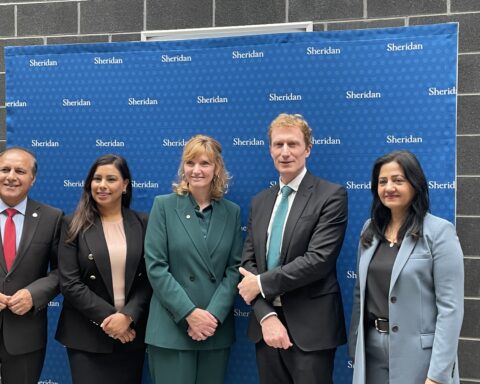A Canada Border Services Agency (CBSA) intelligence report had signaled that Indian nationals will be increasingly using sophisticated human smuggling networks in a prescient warning before the recent deaths of a family of four at the U.S. – Canada border.
“Once (pandemic-related) travel restrictions begin to lift, more Indian nationals are expected to look for employment opportunities in wealthier countries such as Canada and will likely use the resources of sophisticated smuggling networks to do so,” according to the report, which listed India as a top source country for illegal immigrants.
The Refugee Claims Analysis Report 2020 (RCAR) by CBSA’s Targeting Directorate, obtained by Richard Kurland, a Vancouver- based immigration lawyer and legal expert, forecasted that India will very likely continue to be a top source country for irregular migration in the post-pandemic era.
The report listed the push factors for Indian nationals seeking to come to Canada as “High unemployment rate; insurgency; environmental degradation (i.e. dangerous levels of air pollution); extensive poverty; caste discrimination; corruption; increasing religious tensions (i.e. attacks on religious minorities); gender-based violence against women and girls; honour killings; discrimination against LGBTQ+ community.
“Unless we allow our Canadian officials to liaise more closely with Indian authorities, we can expect to see more tragedy,” Kurland told New Canadian Media as investigations continue in Canada, the U.S. and India into the deaths of the four Indian nationals, including those of a baby and a teenager.
They are believed to be a family that was separated from a larger group of Indian migrants trying to enter the U.S. from Canada, near Emerson, Manitoba.
NCM has contacted CBSA for comment on its intelligence report.
Human smuggling network
The family found frozen to death have been identified as Jagdish Patel, 39, his wife, Vaishaliben, 37, and their children Vihangi, 11, and Dharmik, three. They were residents of Nava Dingucha village in Gujarat.
A CBC News report said “Indian police official A.K. Jhala told Reuters they have detained six people who were running a travel and tourism company” in Gujarat in connection with the case.
“We are now trying to nab the human traffickers who managed to send this family and others abroad via illegal channels,” said Jhala,.
Steve Shand, 57, a Florida man of Jamaican origin has been charged by U.S. authorities, who believe he is part of a larger human trafficking smuggling network, according to a criminal complaint filed with the U.S. District Court in Minnesota.
A former senior RCMP officer stationed in overseas diplomatic missions said the lack of Canadian intelligence and resources in India is a key factor that helps human traffickers and smugglers operate.
“Sometimes there is only one officer in Delhi responsible for the whole country looking at everything from visa fraud to murders, and there are challenges communicating and working with local law enforcement,” he told NCM, declining to be named.
“And there are scores of cases every year…we need more presence in India and other top source countries to combat immigration fraud, human smuggling and trafficking,” said the retired officer, who is an expert on global migration patterns.
The 2021 Trafficking in Persons Report by the U.S. State Department said the Indian government has modestly increased anti-trafficking law enforcement efforts, although efforts remained inadequate compared to the scale of the problem.
“A lack of accountability for misconduct and corruption persisted at various levels of government, contributing to the perception of widespread impunity for trafficking crimes,” the report noted.
Emigration from Punjab
While the state of Gujarat is in the news with the recent deaths, the state of Punjab, where most South Asian Canadians hail from, has been a major source of illegal migration to Canada.
According to the data released by the Punjab Police on Twitter, 900 cheating and fraud cases were registered against travel agents in Punjab between Jan. 1, 2017, and March 15, 2018, with 137 cases (or 15 per cent) reported in Mohali city. Police in Mohali city registered 190 cases of visa fraud in 2018, receiving an average of five complaints a day.
Punjab is also the state which has the most number of illegal immigration consultants, with only 2,880 registered while over 6,000 firms were found to be operating without a licence.
The Punjab government is now looking to set up an agency that recruits students from the state to study in places like Canada.
The Canadian Centre to End Human Trafficking said it is saddened by the latest tragedy “that was caused — apparently and according to the reported evidences — by human smugglers.”
“Many people in Canada continue to confuse human trafficking with international border smuggling. In reality, human smuggling and human trafficking are very different crimes,” the centre said in an emailed statement to NCM.
It described human smuggling as facilitating the illegal entry of an individual into Canada for a profit, and human trafficking as an illegal act for the purpose of exploiting victims or facilitating their exploitation.
A multiple-award winning journalist, Fabian Dawson is an internationally acclaimed author, filmmaker and media expert. His work over the last four decades spans the globe and he also serves as a consultant/strategic advisor to a variety of international companies. As deputy editor-in-chief of The Province, part of the Postmedia chain, Dawson led initiatives within a special publications group to provide directed content for a variety of organisations. He was named the 2019 recipient of the Bruce Hutchison Lifetime Achievement Award at Jack Webster Awards. Dawson has been invited by the governments of India, Malaysia, Taiwan, China, Hong Kong and the United States to act as a media observer/advisor on a variety of Asian-Canada issues. Dawson, now operates FD Media, which specializes in harnessing editorial assets to revenue generating opportunities.






[…] India is one of the countries where immigration fraud is rampant, according to an internal memo by the Canadian Border Service Agency. […]
[…] India is one of the countries where immigration fraud is rampant, according to an internal memo by the Canadian Border Service Agency. […]
[…] ago that Jagdish Patel, 39, Vaishailben Patel, 37, and their children Vihangi, 11, and Dharkmik, 3, died trying to cross the U.S.-Canada border irregularly in search of the same. That family, originally from India, had walked 11 hours before freezing to […]
[…] ago that Jagdish Patel, 39, Vaishailben Patel, 37, and their children Vihangi, 11, and Dharkmik, 3, died trying to cross the U.S.-Canada border irregularly in search of the same. That family, originally from India, had walked 11 hours before freezing to […]
[…] ago that Jagdish Patel, 39, Vaishailben Patel, 37, and their children Vihangi, 11, and Dharkmik, 3, died trying to cross the U.S.-Canada border irregularly in search of the same. That family, originally from India, had walked 11 hours before freezing to […]
[…] India is one of the countries where immigration fraud is rampant, according to an internal memo by the Canadian Border Service Agency. […]